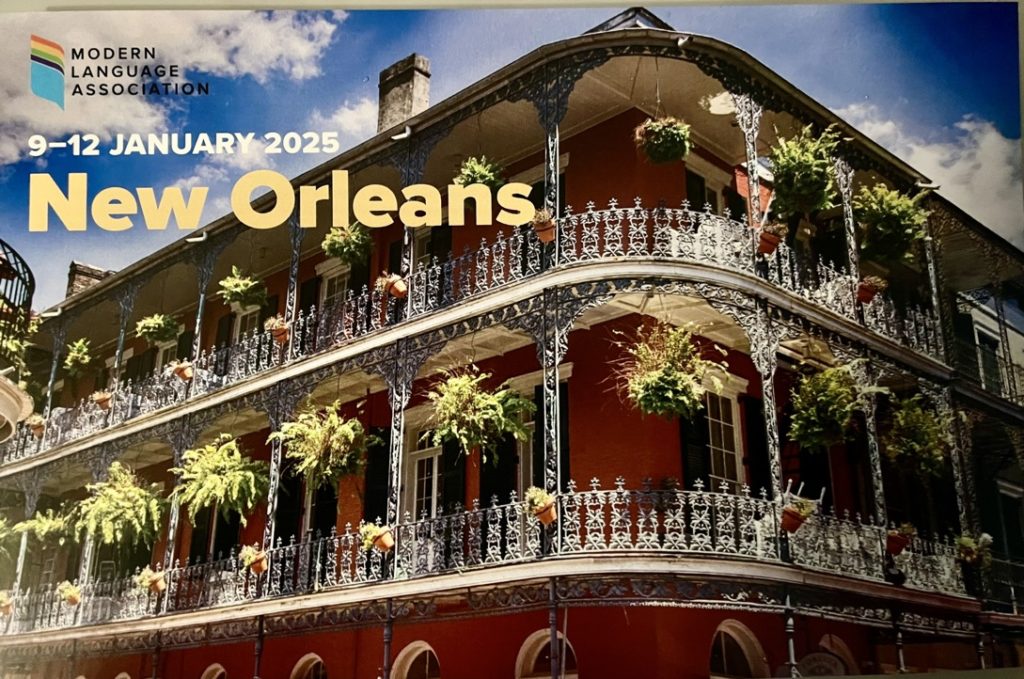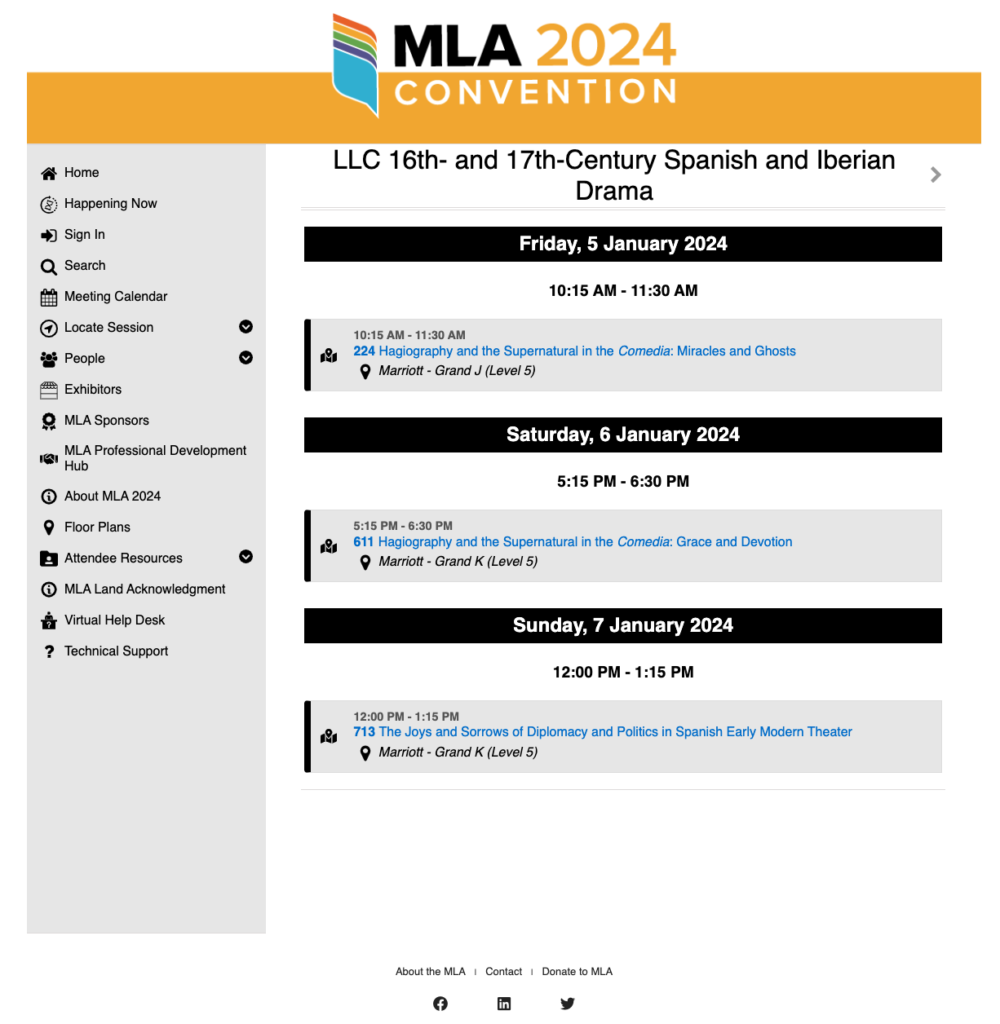Call for Papers
16th and 17th Century Spanish and Iberian Drama Forum
Love’s Avatars in Cervantes’s Plays
Co-sponsored with the Cervantes Society of America (CSA)
Submissions on adaptations, appropriation, and or translation of Miguel de Cervantes’s Theater exploring the rich tapestry of love, redemption, and human emotions. 250–300-word abstract and 1-page CV due Monday, March 15th, 2024, to Carmela Mattza at: cmattza@lsu.edu.
NARRATIVE
The 16th-17th Century Spanish and Iberian Drama Forum of the MLA invites scholars, researchers, and practitioners in the field of early modern studies to submit their research papers for MLA’s upcoming conference in 2025, focusing on the theme: “Cervantes’s Plays: Love’s Avatars from Disillusionment and Deceit to Redemption, Enlightenment, and Gratitude”.
The plays of Miguel de Cervantes delve deep into the intricate nuances of human relationships, exposing the complexities of love, the challenges of disillusionment, the perils of deceit, and the ultimate journey toward redemption, enlightenment, and gratitude. This panel encourages submissions that offer fresh perspectives, innovative analyses, and interdisciplinary approaches to understanding Cervantes’s exploration of love’s complexities in his theatrical creations and recreations.
Potential topics for exploration include, but are not limited to:
-How gender roles and societal expectations influence the portrayal of love and its challenges in Cervantes’s plays.
-How the portrayal of disillusionment (desengaño) in Cervantes’s plays and its impact on characters and relationships resonate with different cultures and historical periods
-What are the metaphorical and literal depictions of murder and treachery, and their consequences in the Spanish Early Modern Theater.
-How gratitude, reconciliation, and the themes of forgiveness and redemption in the context of love and human relationships are conveyed through state elements, gestures, and acting choices in adaptations and reinterpretations.

CFP Games and Players in Iberian and Early Modern Theater
We invite submissions that explore and analyze the role and/or representation of games, players, tricksters, or related topics, in the Spanish comedia. Submit a 250-300 word abstract and 1 page CV by March 15, 2024, to Carmela Mattza at: cmattza@lsu.edu.
NARRATIVE
The 16th and 17th Century Spanish and Iberian Drama Forum of the MLA invites scholars, researchers, and practitioners in the field of early modern studies to submit their research papers for MLA’s upcoming conference in 2025, focusing on the theme: “Games and Players in Early Modern Theater.” The early modern period witnessed a remarkable evolution in theatrical arts, exploring the intricacies of human nature, society, and culture through the lens of dramatic performances and texts. The topic of games did not escape this theatrical scene, where the lexicon involving naipes, among other games, and characters such as tahúres were commonly seen and heard on the stages. A reflection of a society engaging ever more in leisure activities, games quickly became a point of encounter and contention. Cervantes’ invitation to a “mesa de trucos” in the prologue of his Novelas ejemplares is by now a cliché that has helped to view the act of reading as a game. Playwrights, such as Lope de Vega and Tirso de Molina, also took advantage of lexicon and common ludic practices in their theater. In recent history, ludology gained traction ever since historian Johan Huizinga’s influential book Homo Ludens (1938). Different scholars, such Roger Caillois and Brian Sutton-Smith, among others, have further developed, critiqued, and expanded on Huizinga’s theory. The field itself has been influential in sociology, pedagogy, and psychology, to name a few fields. With such broad avenues, this session aims to delve into the multifaceted relationship between explicit or implicit games, players, and cheaters in the early modern theater. We invite papers that explore the dynamic interplay between theatricality, performance, and the socio-cultural context of the time. We welcome submissions that address, but are not limited to, the following topics:
· Theatrical Games: Examining the representation of games (cards, dice, chess, sports, hunting, etc.) within the context of early modern theatrical productions.
· Player Dynamics: Analyzing the roles and dynamics of actors, playwrights, and other contributors to the theatrical landscape as players.
· Audience Engagement: Exploring the interaction between performers and audiences, and the role of games in shaping this relationship.
· Cultural Significance: Investigating the cultural, political, and societal implications of games and performances during the early modern period as staged in theater.
· Theater as game: Approaching theater as a form of game and the playwrights as players.
CFP Bodies Beyond Label
This panel seeks papers that reveal moments of joyful sexual and gender expression in the theater of early modern Iberia. Submit a 250-300 word abstract and 1-page CV by March 15, 2024, to Carmela Mattza at: cmattza@lsu.edu.
NARRATIVE
Bodies without Labels in the Theater of Early Modern Iberia
We currently live in a time of shifting paradigms regarding gender and sexual expression as we begin to discover bodies without labels. Such was not the case in earlier periods of European history since the Middle Ages when inquisitional and other modes of oppression were common. With this stark contrast in mind, this session seeks papers that will reveal moments of joyful sexual and/or gender expression in the theater of early modern Iberia. More than thirty years have passed since Frédéric Serralta published what was then a surprising essay. He showed that Cosme Pérez (1593-1672), an actor on the Spanish stage, took on the persona of Juan Rana, and under this name he performed in more than fifty theatrical works, mostly interludes (entremeses). These works were written expressly for him, so that his comic genius could be foregrounded. Onstage, many of Juan Rana’s jokes and double entendres turned upon his same-sex desire; and even in some interludes he played with the ambiguity of gender. Although he was arrested for sodomy in 1636, Juan Rana was saved from the clutches of stern justice and quickly freed due to the actor’s close relationship with the noble class and the reigning royal family. The Spanish empire, then, was not simply a lugubrious place where sodomites were persecuted and condemned to death. Rather, it was a space that allowed for multiple voices, although requiring in most instances that they speak through double entendres, hyperbole, enigmas, circumlocutions, and the language of mythology. Lope de Vega, for example, uses such ambiguities and the language of melancholy to depict a friendship that might have seemed to be too close in La boda de dos maridos. Of all mythological figures, Ganymede was the most frequently alluded to when hinting at homoaffective practices. As a multivalent figure, he appears as an image of incest in Lope’s El castigo sin venganza. And what are we to make of Tirso de Molina’s El vergonzoso en palacio where Serafina rehearses a one-woman performance, taking on the role of various male characters with remarkable passion and intensity? Or how do we interpret the affectivity between Cesar (dressed as a woman) and Serafina in Calderón’s Las manos blancas no ofenden? This session, then, seeks to tease out moments in the theater of early modern Iberia where bodies feel joy and attraction as gender roles and labels become fluid or fade away.
· Cultural Significance: Investigating the cultural, political, and societal implications of games and performances during the early modern period as staged in theater.
· Theater as game: Approaching theater as a form of game and the playwrights as players.
This panel seeks papers that reveal moments of joyful sexual and gender expression in the theater of early modern Iberia. Submit a 250-300 word abstract and 1-page CV by March 15, 2024, to Carmela Mattza at: cmattza@lsu.edu.
